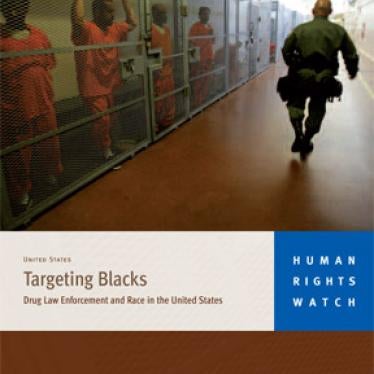The Honorable Jim Webb
United States Senate
Washington, DC 20510
The Honorable Arlen Specter
United States Senate
Washington, DC 20510
Re: Human Rights Watch supports S. 714 - the National Criminal Justice Commission Act of 2009
Dear Senator Webb and Senator Specter:
I am writing to express Human Rights Watch's strong support for S. 714, the National Criminal Justice Commission Act of 2009. Enactment of this legislation would begin a long overdue examination of criminal justice policy in the United States.
For many years Human Rights Watch has documented US criminal justice practices that violate human rights. Our reports have explored racial disparities in arrests and incarceration (Targeting Blacks: Drug Law Enforcement and Race in the United States); the incarceration of the mentally ill (Ill-Equipped: U.S. Prisons and Offenders with Mental Illness); overly harsh punishment of juveniles (The Rest of Their Lives: Life Without Parole for Child Offenders in the United States); prison rape (No Escape: Male Rape in U.S. Prisons); and the unavailability of drug dependence treatment in prison (Barred from Treatment: Punishment of Drug Users in New York State Prisons).
The time has come for a comprehensive review and a fundamental rethinking of US criminal justice policy, particularly the use of incarceration. Just last month, the Bureau of Justice Statistics (BJS) released figures showing that the US incarcerated population has reached a new all-time high, with more than 2.3 million people behind bars. This gives the United States an incarceration rate of 762 per 100,000 residents - the highest rate in the world, dwarfing those of other democracies like Great Britain (152 per 100,000), Canada (116), and Japan (63).
Vulnerable populations are especially hard hit by US incarceration policy. Black men in the United States are 6.6 times more likely than white men to be incarcerated, and more than ten percent of all black men ages 25 to 39 are behind bars on any given day. A 2006 BJS study found that large numbers of prisoners suffer from chronic mental health problems like major depression and psychotic disorders. Finally, Human Rights Watch has found that there are more than 2,500 people in US prisons serving sentences of life without parole for crimes they committed as children - a sentencing practice that does not exist anywhere else in the world.
These policies violate fundamental notions of fairness and erode public confidence in the criminal justice system while providing very little return for public safety. And the enormous cost of mass incarceration drains resources that could be spent on health, education, and other essential public services.
The United States has ratified three international human rights treaties that relate to criminal justice practices: the International Covenant on Civil and Political Rights, the International Convention on the Elimination of All Forms of Racial Discrimination, and the Convention against Torture and Other Cruel, Inhuman or Degrading Treatment or Punishment. Monitoring bodies for these treaties have repeatedly expressed concern about racial disparities, incarceration of the mentally ill, harsh punishment of juvenile offenders, and other aspects of the US criminal justice system.
The commission established by S. 714 would "undertake a comprehensive review of the criminal justice system," and make recommendations "to improve public safety, cost-effectiveness, overall prison administration, and fairness in the implementation of the Nation's criminal justice system." This would be an essential first step toward a more rights-respecting approach to crime control and public safety, and would bring the United States closer to compliance with its treaty obligations.
For all of these reasons, Human Rights Watch urges passage of S. 714, the National Criminal Justice Commission Act of 2009.
Very truly yours,
David C. Fathi
Director, US Program
Cc: Senate Judiciary Committee and Senators Bingaman, Brown, Burris, Carper, Gillibrand, Hagan, Kennedy, Landrieu, McCaskill, Murray, Reid, Tester, Udall, and Warner







